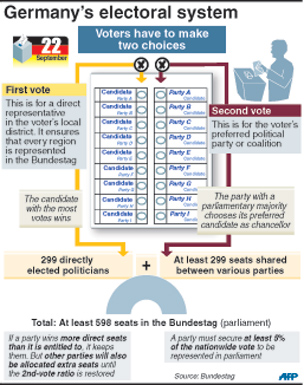Sunday Times 2
German election foes could make up and govern
View(s):BERLIN, Sept 21 (AFP) -Many countries would only do it when facing war or major disaster, but for Germany it’s a very real scenario after tomorrow’s election: a grand coalition government of the two big parties. After months of waging battle on the campaign trail, Chancellor Angela Merkel’s conservatives and the opposition Social Democratic Party (SPD) may yet be forced into such an uneasy marriage.

Some see such a left-right leadership as a betrayal of the very spirit of democracy, others as a pragmatic way to run a country in turbulent times. “I couldn’t imagine it in a country like Great Britain or the United States,” said Sudha David-Wilp, Senior Transatlantic Fellow at the German Marshall Fund of the United States.
“But in Germany there isn’t that sense of partisanship and, right now, looking at the two parties, it’s very hard to see major differences between them. “Most Germans see a grand coalition as offering stability. They think it’s better to have both major parties as stakeholders in their government when we’re facing serious issues.” Germany has been ruled by grand coalitions twice before, most recently in Merkel’s first 2005-09 term, when she and her then-finance minister Peer Steinbrueck — now her SPD election rival — jointly tackled the impact of the world financial crisis.
Together the two showed “relatively good crisis management” amid the economy’s worst post-war downturn, said Reimut Zohlnhoefer of Heidelberg University. Many voters now favour such political odd couples, which can result when neither camp wins a clear parliamentary majority.
An opinion poll published Thursday showed Merkel’s current coalition of CDU and her pro-business allies, the Free Democrats, garnering only 45.5 percent of support, short of a parliamentary majority. The survey commissioned by public television ZDF had Steinbrueck’s SPD polling 28 percent and its potential allies the ecologist Greens with 9 percent.
A poll last month showed 26 percent support for another grand coalition.
“The German view of democracy is tilted toward consensus,” said Oskar Niedermayer of Berlin’s Free University.
“Many people generally believe that in a crisis, such as the euro crisis, the two big parties should tackle things together … There are differences, but not that many, and the people know it.”– ‘Politicians are all the same’ – The campaign race has indeed been deemed shallow and devoid of real battle issues as the two big parties have moved toward the political centre.
Merkel’s Christian Democratic Union (CDU) is phasing out nuclear power and scrapped army conscription, while the working-class SPD a decade ago drove through painful labour and welfare reforms. All this is feeding the popular notion that “the politicians are all the same”, say analysts.
Hajo Funke of the Free University said grand coalitions should only be “emergency solutions” because they can lead to watered-down compromises and leave people wondering why they voted at all. “When this happens, voters distance themselves, hopes are dashed, there is a creeping resignation or apathy or disenchantment with politics, if not democracy itself,” he said, with the result a “less vigorous political discourse and even a paralysis of the democratic process”.
“That’s the danger,” agreed David-Wilp. “This is why in the last few years we have seen more fragmentation in the German political landscape,” she said, citing the emergence of the small Internet-freedom Pirates party and the eurosceptic AfD.
“That’s where the mainstream parties have to be careful and take a stand on their core issues. Because if they don’t, they will leave a vacuum for these small parties. And maybe after Sunday it’s going to take some time to get a coalition simply because there is such fluidity in the political system here right now.”

